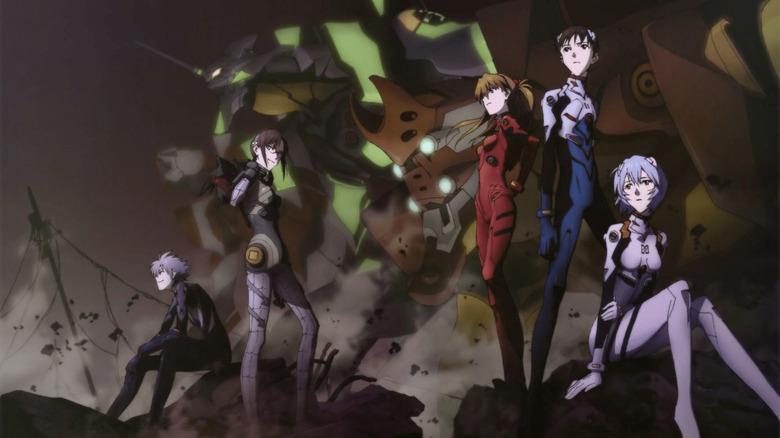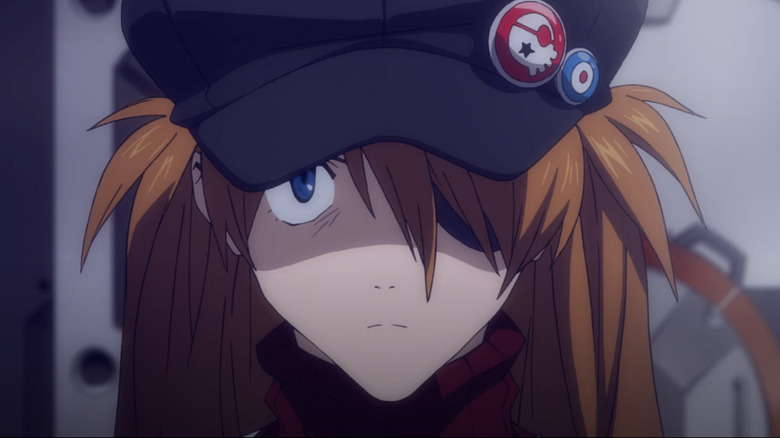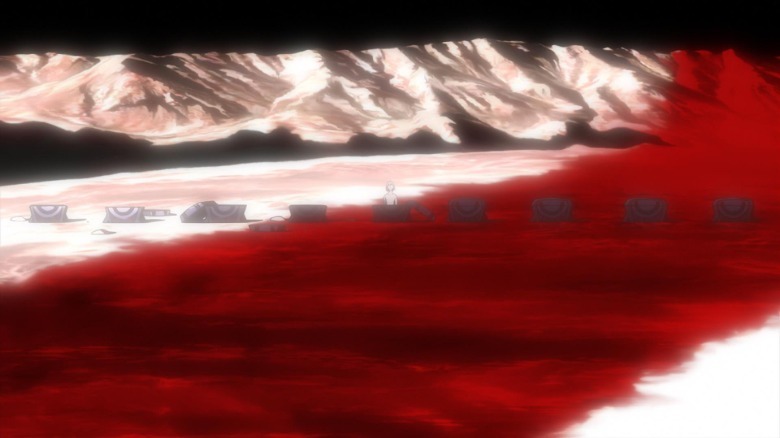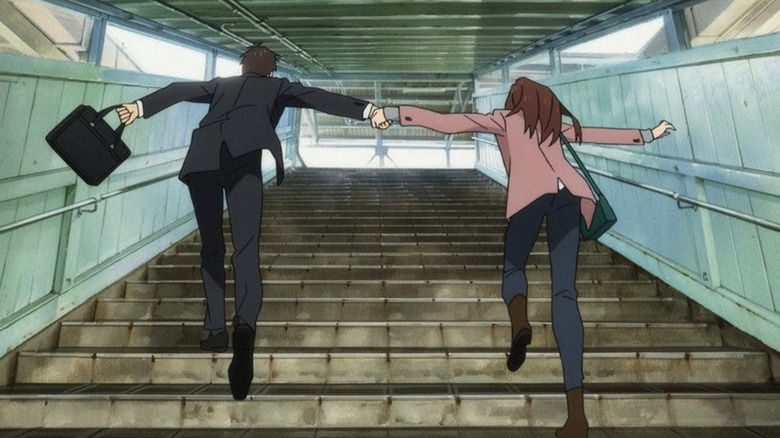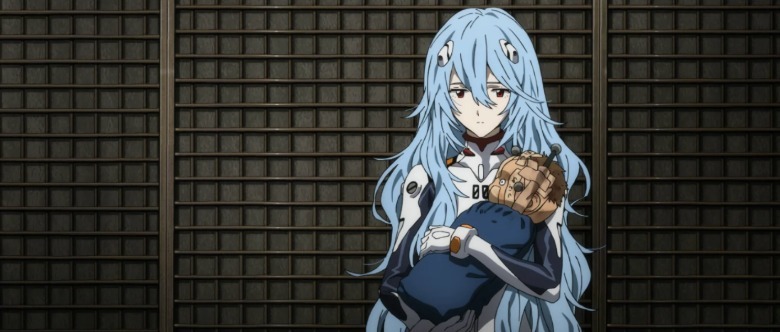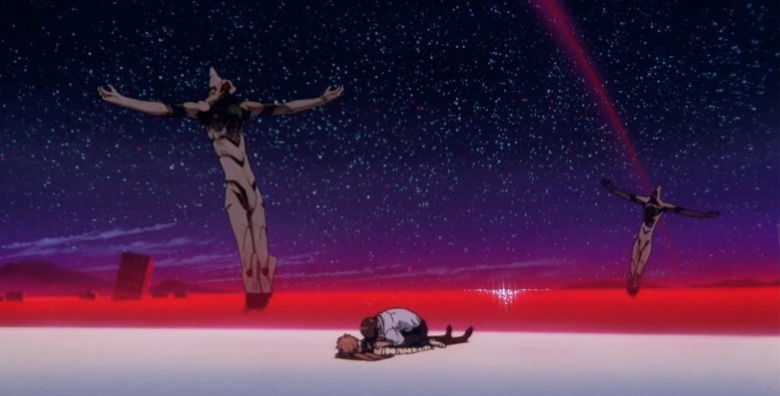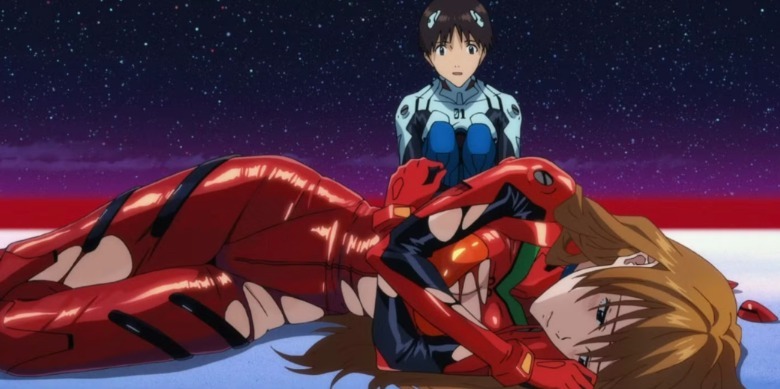Neon Genesis Evangelion Satirized One Of Animation's Biggest Tropes
From Bugs Bunny to Spider-Man, cartoon characters don't age. The Simpsons family will never grow old while Marvel and DC Comics' stables of superheroes/villains remain trapped in the illusion of change. People drawn with a pencil and paper are frozen in an instant of time, and even when those images are animated together the characters rarely age. Rarely. The acclaimed mecha anime "Neon Genesis Evangelion," however, is not just a coming-of-age story, but it also reckons with how cartoons (and their fans) prefer to stay children.
Series creator Hideaki Anno helmed the original 1995-1997 run of "Evangelion" (26 episodes and a movie) after coming out of a depressive state. Anno's struggles became the characters'. Central protagonist Shinji Ikari has a responsibility to pilot a giant "Evangelion" cyborg, but he struggles with the Freudian "Hedgehog's Dilemma" (fear of getting close to others lest you hurt them or yourself) even more so than he does with battling giant monsters (called "Angels").
His fellow pilots don't have it any easier: Asuka Langley Soryu's brashness conceals self-hatred, and Rei Ayanami drifts through life like a ghost, indifferent to whether she even lives or dies. The pilots' guardian, Misato Katsuragi, tries to be the mother they need but can only do so much when she has her own problems to work through.
By the 2000s, Anno's mental health (thankfully) improved and he decided to revisit "Evangelion," thinking he'd had something to say with his new outlook. (Didn't hurt that the series turned into a merchandising cash cow despite how "sick" its characters became.) The resulting four films became known as "Rebuild of Evangelion."
The first two "Rebuild" films loosely remake the original (the main difference is the second one introduces a new pilot character, Mari Makinami), so you can feel the series is resting on its laurels. Then "Evangelion 3.0: You Can (Not) Redo" completely resets the board with a 14-year-time skip into the future. Due to all that time passing, many of the main characters' appearances have changed — except the Eva pilots. Asuka explains this is the "Curse of Eva," where piloting the Eva units leaves them unable to physically age, trapping them as eternal children.
The Curse of Evangelion explained
The "Curse of Eva" is only mentioned that one time in "You Can (Not) Redo" and the mechanics aren't explained. (The common fan answer is that the curse is due to prolonged exposure to LCL, the liquid that the children are drenched in when piloting.) Don't think too hard about it, either; the main point of the curse is thematic.
There's a joke that "Rebuild of Evangelion" is the original series but on antidepressants. In "You Can (Not) Redo," it falls off its meds and drags you down too. "Evangelion 2.0: You Can (Not) Advance" ended with Shinji destroying an Angel that had consumed Rei to save her, finally becoming a man who does more than what others tell him to do. Misato urges him on, "Do it for yourself [Shinji]! Do it because this is what you want!"
Shinji spends the next 14 years trapped inside Eva Unit-01, unaware of the time passing, and when he wakes up everyone hates him for triggering an apocalyptic event by combining his Eva with the Angel. Shinji's depression comes surging back worse than ever; when Asuka confronts him at the end of the film, she observes: "All you do is think about yourself. You think shutting up is the answer," she berates him. "No matter how many years pass, you're still the same annoying brat." But those 14 years haven't changed Asuka, either.
The children may be the only ones cursed to never age, but they're not the only "Evangelion" characters stuck in arrested development. Misato is 29-years-old in the original series (and so 43 after the time skip) but she's often just as childish as her wards. She doesn't clean her apartment, subsists off of alcohol and fast food, and keeps her ex-boyfriend Kaji at a distance even though she loves him.
Then there's Shinji's father Gendo, who wears the stone face of an enigmatic mastermind but is really just as lonely as his son. His goal is not Godhood, but simply reuniting with his late wife (and Shinji's mother) Yui. Gendo, too, can't let go of the past or recognize the future Yui gave him (Shinji).
Due to these themes and some select moments of imagery and dialogue (see below), several fans interpreted the "Rebuild" films not as remakes of the original "Evangelion," but as sequels where the characters are trapped in a time loop, forced to play out the same basic events over and over.
The final film, "Evangelion 3.0 + 1.0: Thrice Upon A Time" is about breaking that loop.
Rebuild of Evangelion allows the children to finally grow up
The first half of "Thrice Upon A Time" is set in a peaceful village, where Shinji, Asuka, and Rei take a break from the action. Their old friends Toji, Kensuke, and Hikari have all grown up, becoming adults and building peaceful, normal, and domestic lives that the Pilots have been cursed not to. Shinji breaks the curse and gives his friends the chance to live those lives.
In Shinji and Rei's last scene together, she is holding a doll representing an infant. Motherhood has been a motif with Rei's character going back to the original "Evangelion," and obviously a dream she could never realize, especially with the newly-introduced curse.
Shinji and Asuka's goodbye takes place on a surreal shoreline with blood red water, a sight familiar to "Evangelion" fans.
"End of Evangelion" concludes with Shinji and Asuka lying together on that same beach; they're apparently the only two who'd chosen the painful uncertainty of reality over the bliss of non-existence. Shinji strangled Asuka, while she caressed his cheek. Shinji stopped and began to cry, as Asuka looked on in revulsion and whispered, "How disgusting." That scene is a microcosm of the relationship the two share and the world they live in, where people can keep hurting others over and over even if under it all they care about each other (which is one of the ways "Evangelion" resembles "Eternal Sunshine of the Spotless Mind"). Shinji and Asuka have always been on that beach — but no more. They admit they liked each other once, but have grown apart and it's time to move on. To show this time is different? Asuka is finally an adult; her old Eva plugsuit is half-torn and her hair braids are discarded on the ground, because she no longer has any use for them.
Shinji's final act is giving the world a fresh start. He and everyone else can only be happy in a world with no Evangelions (gee, wonder what Anno is saying there), so that is the "Neon Genesis" he creates. In the last scene, an adult Shinji meets Mari at a train station and they run off into a new world, the real world, and one brimming with possibility. The Curse of Eva and the cycle of stagnation it represented is broken.
In "The End of Evangelion," Misato tells a near-catatonic Shinji that, to live, he can't be afraid to make mistakes. She's kept making the same ones over and over again, learning a little bit more each time, and that is inevitable when you choose to accept the risks that life brings. At the end of the film, Shinji has accepted that too; his happiness is not guaranteed, but better that he gives himself the chance to find it.
The message of "Evangelion" never changed (accept yourself, because you're all you've got forever, and go and find your happiness), it simply evolved. Anno ended "Evangelion" the first time by leaving his characters in uncertainty, and he returned to it to end their journey. By letting his characters grow and move on, he hopes his fans will too. If Shinji and Asuka learned there's way more to this life than Evangelions, why can't we?
